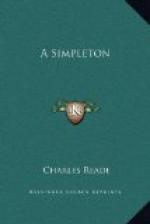Not quite: he was cudgelling his brains in search of some horribly unscientific argument, that might prevail; for he felt science would fall dead upon so fair an antagonist. At last his eye kindled; he had hit on an argument unscientific enough for anybody, he thought. Said he, ingratiatingly, “You believe the Old Testament?”
“Of course I do, every syllable.”
“And the lessons it teaches?”
“Certainly!”
“Then let me tell you a story from that book. A Syrian general had a terrible disease. He consulted Elisha by deputy. Elisha said, ’Bathe seven times in a certain river, Jordan, and you will get well.’ The general did not like this at all; he wanted a prescription; wanted to go to the druggist; didn’t believe in hydropathy to begin, and, in any case, turned up his nose at Jordan. What! bathe in an Israelitish brook, when his own country boasted noble rivers, with a reputation for sanctity into the bargain? In short, he preferred his leprosy to such irregular medicine. But it happened, by some immense fortuity, that one of his servants, though an Oriental, was a friend, instead of a flatterer; and this sensible fellow said, ’If the prophet told you to do some great and difficult thing, to get rid of this fearful malady, would not you do it, however distasteful? and can you hesitate when he merely says, Wash in the Jordan, and be healed?’ The general listened to good sense, and cured himself. Your case is parallel. You would take quantities of foul medicine; you would submit to some painful operation, if life and health depended on it; then why not do a small thing for a great result? You have only to take off an unnatural machine which cripples your growing frame, and was unknown to every one of the women whose forms in Parian marble the world admires. Off with that monstrosity, and your cure is as certain as the Syrian general’s; though science, and not inspiration, dictates the easy remedy.”
Rosa had listened impatiently, and now replied with some warmth, “This is shockingly profane. The idea of comparing yourself to Elisha, and me to a horrid leper! Much obliged! Not that I know what a leper is.”
“Come, come! that is not fair,” said Mr. Lusignan. “He only compared the situation, not the people.”
“But, papa, the Bible is not to be dragged into the common affairs of life.”
“Then what on earth is the use of it?”
“Oh, papa! Well, it is not Sunday, but I have had a sermon. This is the clergyman, and you are the commentator—he! he! And so now let us go back from divinity to medicine. I repeat” (this was the first time she had said it) “that my other doctors give me real prescriptions, written in hieroglyphics. You can’t look at them without feeling there must be something in them.”
An angry spot rose on Christopher’s cheek, but he only said, “And are your other doctors satisfied with the progress your disorder is making under their superintendence?”




